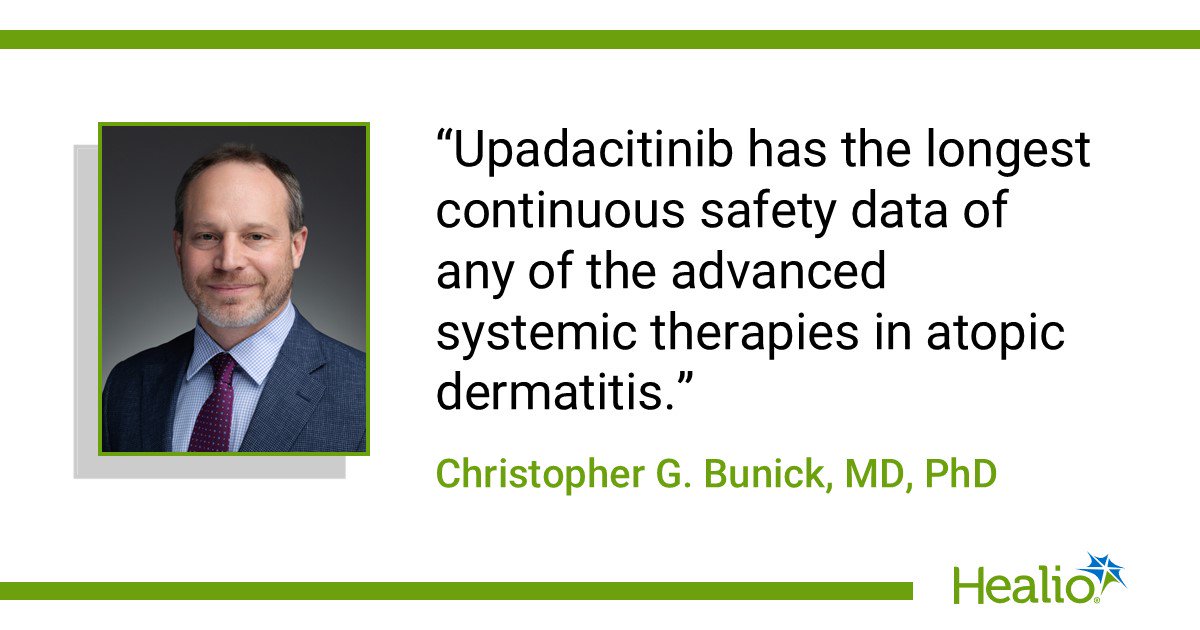[ad_1]
August 05, 2025
2 min read
Key takeaways:
- Upadacitinib is an oral JAK inhibitor FDA approved for atopic dermatitis.
- Upadacitinib demonstrated efficacy and safety in a cohort of patients with chronic hand eczema.
Oral upadacitinib may be a promising treatment option for patients with atopic dermatitis-type chronic hand eczema that is uncontrolled by topical therapies, according to a study published in the Journal of Drugs in Dermatology.
“One of the major stories of dermatology during the last 2 years has been the incredible education that has been done around [chronic hand eczema (CHE)],” Christopher G. Bunick, MD, PhD, associate professor of dermatology in the department of dermatology and program in translational biomedicine at Yale University, told Healio. “If you had asked me 2 years ago about CHE, I would have never known that it was this complex.”

CHE is a common, chronic inflammatory skin condition that lasts more than 3 months at a time and recurs at least twice in a 12-month period. With dry, scaly and pruritic lesions on the palms, fingers and backs of hands, CHE can severely impact patients’ quality of life by interfering with work and daily activities.
According to Bunick, the current treatment algorithm for CHE involves topical corticosteroids as a first-line therapy, followed by delgocitinib (Anzupgo, Leo Pharma) cream, a topical pan-JAK inhibitor and the only FDA-approved treatment for CHE. As Healio previously reported, many patients with CHE report corticosteroid phobia, which negatively impacts treatment adherence.
“What happens for those patients where the topical is not enough?” Bunick told Healio. “That’s where this study could be very valuable for dermatologists.”
In a narrative review, Bunick and colleagues analyzed four trials from the Measure Up and DELTA phase 3 programs, which evaluated the efficacy and safety of upadacitinib (Rinvoq, AbbVie) for CHE. Upadacitinib is an oral, once-daily, selective JAK-1 inhibitor that is FDA approved for the treatment of moderate to severe AD and other immune-mediated diseases.
According to the review, 94.8% of 847 participants and 92.6% of 836 participants had CHE in two of the trials. Results showed that 16% and 23% of those treated with upadacitinib 15 mg and 30 mg, respectively, experienced Hand Eczema Severity Index (HECSI)-75 responses as early as week 1 vs. 4% in the placebo group (P < .001). By week 16, 71% (15 mg) and 79% (30 mg) maintained a HECSI-75 response vs. 14% in the placebo group (P < .001).
Bunick said upadacitinib is effective and safe in this population, despite the concern surrounding JAK inhibitors.
“Upadacitinib has the longest continuous safety data of any of the advanced systemic therapies in AD,” Bunick told Healio. “We are learning that the side effects that had everyone so worried … are actually higher in patients with moderate to severe AD that are not on JAK inhibitor therapy.”
Although upadactinib may be a promising option for patients with CHE, Bunick notes that this review evaluated only the drug’s utility for those with the AD subtype of CHE..
“Though upadacitinib has not been tried in other types of chronic hand eczema other than AD, there is a strong rationale that it may work very well for these other subtypes,” Bunick told Healio.
For more information:
Christopher G. Bunick, MD, PhD, can be reached at christopher.bunick@yale.edu.
[ad_2]
Source link








